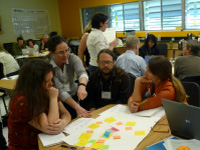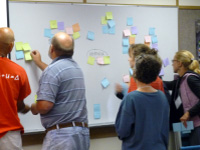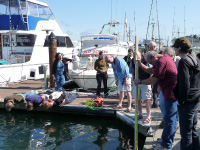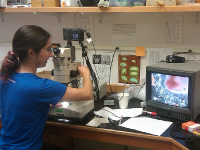This past year the COSEE-Pacific Partnerships (COSEE-PP) Team has concentrated on refining our core work of connecting scientists with community college faculty and students. In addition, we have explored ways to effectively use concept mapping as a tool for assisting scientists and educators to improve their communication skills, develop action plans for their education activities, and produce programming and messaging for a variety of audiences.
DEVELOPING A SERIES OF CONCEPT MAPPING WORKSHOPS
| |  |
| Concept mapping workshop at Cal Poly with COSEE-OS |
We collaborated with
COSEE-OS to adapt their very successful concept mapping workshops to meet the needs of West Coast ocean scientists and informal educators. We added elements of COSEE-PP Co-Director Shawn Rowe’s work that focuses on visible thinking routines, including concept mapping. Using this combination we have run several workshops that have allowed us to broker what we believe will be longer term relationships between scientists and informal educators in our region. These workshops are directed by Shawn Rowe, assisted by Coral Gehrke and Jude Apple.
Cal Poly Collaborative Concept Mapping Workshop – Connecting Scientists with Informal Educators
In Spring 2010, we partnered with COSEE-OS and the Communicating Ocean Sciences to Informal Audiences (COSIA) Educators Network for a three-day workshop based on the COSEE OS scientist-educator collaborative concept mapping model. We targeted ocean scientists from California Polytechnic State University in San Luis Obispo and informal educators from the central California coast. Our goals for the workshop were to engage new scientists and informal educators in our activities, to broker relationships locally between ocean scientists and informal educators, and to learn to use a set of techniques and online tools developed by COSEE-OS for building relationships with ocean scientists through concept mapping. The workshop paired five ocean scientists from the Center for Coastal Marine Sciences at Cal Poly with fifteen informal educators from the Central Coast area to create concept maps of the scientists' work that could be used to develop programming at each informal education site. The workshop was a success, with new partnerships formed, all scientists expressing that they learned something new about communicating their work, and a burgeoning educators' network forming for the central coast.
SMILE Program Concept Mapping Workshop – Connecting Scientists with an Afterschool Program
In January 2011, we partnered with the Oregon State University (OSU) Science and Math Investigative Learning Experiences (SMILE) Program to run a modified, two-day version of the Cal Poly workshop. Seven OSU scientists involved with wave energy research communicated their work with 26 leaders from afterschool science clubs serving rural areas across Oregon. For scientists, the workshop helped them understand concept mapping as a tool for communicating their work and they all indicated that they valued working with the educators and appreciated their expertise as communicators. Several scientists saw a direct benefit to their own work in creating connections for broader impacts, shaping how they might communicate an aspect of their work to their peers, or shaping their teaching. Staff from COSEE Alaska participated in planning meetings and attended the workshop to learn how to prepare for running a similar workshop in April. (View photos from the workshop.)
Concept Mapping with Scientists at Meetings – Creating a Clear Message for Talking About Your Research to Multiple Audiences
| |  |
| Community college faculty create a concept map about hypoxia |
In May 2011, we ran a workshop for graduate and post-doctoral students from OSU’s Hatfield Marine Science Center and University of Oregon’s Institute of Marine Biology during their annual marine labs exchange event. The workshop focused on using concept mapping to create clear messages for communicating their science to any audience by making their research relevant and interesting without oversimplifying it. Participants identified an audience - fishermen, undergraduates, peers, graduate committees, and high-school students - and aspects of their work that are easy to communicate and difficult to communicate. Each participant then created two concept maps. The first was a general explanation of their work from which they developed a theme statement. The second map articulated how they might best communicate that theme to their chosen audience.
Based on overwhelmingly positive evaluations from this activity, we think this model is an effective way to work with scientists on how to better communicate their research, and believe the workshop can be replicated as a professional development activity at meetings and conferences where scientists gather. To test this, we ran the workshop at COSEE-OLC’s Improving Your Broader Impacts event in June that targeted scientists, university faculty, staff, post docs and graduate students throughout western Washington. The session was very well received. We will continue testing this model in at the Western Society of Naturalists annual meeting in November where we have been invited to give their Student Workshop.
Concept Mapping with Informal Educators and Volunteers – a Workshop to Engage Informal Audiences
As part of our interactions with informal education organizations in the Pacific Northwest, Shawn presented a workshop at the annual Sharing the Coast Conference, sponsored by the Oregon Shores Conservation Coalition CoastWatch and the Oregon Chapter of the Northwest Aquatic and Marine Educators organization, for 20 informal educators and volunteers. The workshop - “How can cultural and historical knowledge help you communicate about science with the public?” - focused on using concept mapping and basic knowledge about narrative techniques to develop clear, memorable, and relevant messages for audiences, and which take into account their prior knowledge, backgrounds, and assumptions.
Communicating Controversial Topics using Concept Mapping – a Workshop for Scientists and Educators
Shawn Rowe was invited to give a Teaching Seminar at the 2011 Oregon Academy of Science (OAS) Meeting. OAS promotes scientific research and education in Oregon. The seminar was attended by community college science faculty, scientists, and graduate students. Shawn’s presentation focused on how concept mapping is used to facilitate learning conversations that recognize differences in beliefs and opinions, while simultaneously not allowing those to dominate. Two of the community college faculty attendees are on a working group to redesign the curriculum for courses on critical thinking about science, and intend to introduce this material to that group.
| |  |
| Community college faculty examine organisms growing on docks using “belly biology” and an underwater camera |
IMPROVING THE OCEAN SCIENCE CONTENT OF COMMUNITY COLLEGE COURSES
This past summer COSEE-PP offered three week-long workshops for community college faculty. Each workshop is run by a series of scientists who present information on their science and work with the faculty on how best to incorporate the science into the community college classroom. Jude Apple and Coral Gehrke ran a workshop focused on the marine and coastal science of the Salish Sea at the Shannon Point Marine Center, Western Washington University. Mike Hadfield worked with community college faculty from Hawaii and several of the Pacific islands to explore microbes in the sea at the Kewalo Marine Laboratory, University of Hawaii at Manoa. Jan Hodder and Coral Gehrke ran a workshop on marine science at the Oregon Institute of Marine Biology, University of Oregon. A total of 41 scientists and 67 community college faculty have been involved in these workshops since we began offering them in 2009.
PROVIDING COMMUNITY COLLEGE STUDENTS WITH OPPORTUNITIES TO CONDUCT RESEARCH
 | |
PRIME intern photographs organisms on plates to document development | |
Over the past four years, COSEE-PP has offered
Promoting Research Investigations in the Marine Environment (PRIME), an internship program similar to the National Science Foundation’s Research Experience for Undergraduates. PRIME is an innovative program that places community college students with a marine lab scientist mentor for an 8- to 10-week summer research experience. To date, the program has engaged 25 scientists and 31 community college student interns in projects at the Oregon Institute of Marine Biology, Hatfield Marine Science Center, Shannon Point Marine Center, and Kewalo Marine Laboratory. Last summer we began looking at ways to foster communication between interns located at the different sites. Interns now contribute to the
PRIME blog and we use videoconferencing, Skype, and livestreaming on the web to broadcast their final presentations.
Interns are encouraged to use their experience to further their careers. Several have continued working in their mentor’s lab after the program has ended, and one of our mentors wrote a supplemental REU grant to bring his PRIME intern back the following summer. We have also supported five interns to attend national and regional conferences, where they presented a poster on their research.
Our evaluation of PRIME demonstrates that the program is a successful model for exposing community college students to marine science research and in engaging scientists in broader impacts activities. PRIME provides valuable experiences for the students, and there is great interest in these types of opportunities. Marine lab scientists see value in the program and in working with community college interns. Similar findings between sites indicate that that this type of distributed intern network is replicable. The major impact of PRIME is broadening the participation of underrepresented groups in science.
To learn more about COSEE-PP activities contact Coral Gehrke or visit the COSEE-PP website.

